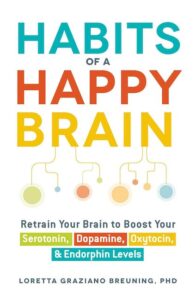Loretta Breuning, PhD, is the Founder of the Inner Mammal Institute and Professor Emerita of Management at California State University, East Bay. She is the author of many personal development books, including Habits of a Happy Brain: Retrain Your Brain to Boost Your Serotonin, Dopamine, Oxytocin, and Endorphin Levels. As a teacher and a parent, Loretta was not convinced by prevailing theories of human motivation. Then she learned about the brain chemistry we share with earlier mammals, and everything made sense. So, she began creating resources that have helped thousands of people make peace with their inner mammal.
Dr. Breuning’s work has been translated into sixteen languages and is cited in major media. Before teaching, she worked for the United Nations in Africa. Loretta gives zoo tours on animal behavior after serving as a Docent at the Oakland Zoo. She is a graduate of Cornell University and Tufts. The Inner Mammal Institute offers videos, podcasts, books, blogs, multimedia, a training program, a video course, and a free five-day happy-chemical jumpstart. Meet Loretta:
You are an author, but is it your day job? If not, what fills your days? Writing fills my days now because I’m retired from a career as a college professor. So, I don’t expect to make money from writing, but it is my primary activity.
Did you always want to be an author? Yes, I always wanted to be an author, but I did other work to pay the bills until I was in my 50s.
What is your most recent book, and what inspired you to write it? In January 2024, I published Why You’re Unhappy: Biology vs Politics. I was very eager to write it to correct misconceptions surrounding my main book, Habits of a Happy Brain: Retrain your brain to boost your serotonin, dopamine, oxytocin, and endorphin levels. I do not agree with much of what we hear in the mental health world today. I think ups and downs are natural, and we should  learn to manage them instead of “diseasifying” them. It’s very disempowering. I wanted to help understand the animal origins of emotions because that makes them easier to manage.
learn to manage them instead of “diseasifying” them. It’s very disempowering. I wanted to help understand the animal origins of emotions because that makes them easier to manage.
I have a novel coming out in January 2025: The Jane Goodall of Goats. It’s about a family that inherits a goat farm and observes the reality of animal behavior. They try to teach the world how the mammal brain works but face opposition. I thought this would be a good way to reach more people with the facts about our animal brain.
How do you hope your book uplifts those who read it? My books help people spark happy brain chemicals in healthy ways by understanding the job of these chemicals in animals. This knowledge was very uplifting because I saw our happy brain chemicals are not always designed to be on. They’re meant to turn on in short spurts to spark survival action, so we always have to do more to get more. So, there’s no need to believe you are broken if you’re not floating on endless happy chemicals because no one else is. People find this knowledge a big relief. Step Two is to know that your happy chemicals are controlled by neural pathways built from past experience, but we have a limited ability to carve new neural pathways. This simple, practical explanation of how to rewire uplifts people with unwanted habits. But also, how to accept what you can’t rewire.
What are you most excited about with this book? I’m excited that Why You’re Unhappy said what needs to be said, even though it’s controversial. It’s doubly controversial. First, we need to acknowledge that the animal brain inside us is not naturally happy but prone to conflict, and second, we can build the skill of controlling this animal brain instead of believing we have a disorder.
How did writing a book help your career take off? I get fabulous feedback from readers who credit my work with huge life improvements and help me spread the word to others. That keeps me excited about the next book I have in mind, even if the numbers are not huge. My work does not have the approval of established institutions, so it’s great to have the enthusiastic support of individuals.
What advice would you give someone wanting to succeed in your professional industry? We all face the painful choice between what is popular at one moment in time and what feels authentic. While raising my family, I had to go along with the popular thing (more or less). So, I don’t necessarily believe a person can be a “success” while being authentic. We may have to squeeze the time and money for authentic writing after we take care of our responsibilities.
How do you handle setbacks and criticism? I don’t focus on criticism. I tell myself that the critics do not necessarily represent anything except themselves. So, I don’t give them access to my mind. I could not have this attitude if I were trying to make a living from writing, but since I’m retired, I just focus on my next creation. Our brain is designed to reward forward action, so this feels good.
Being an author today is like running a business. How do you manage all your publicity, social media and keep your engagement up with readers? I focus on the aspects I enjoy. For example, I enjoy writing my newsletter and responding to reader email. This has more depth and sincerity than social media in my opinion. I also love graphics, so I focus on that aspect of social media. Powerpoint presentations are another way to enjoy graphics. I also love to podcast since I get to express myself in depth. I post on social media daily, but I do not like online discussions. I do not like group activities. As for publicity, I have tried hiring people many times and never had a good outcome. I’m open to suggestions!
How do you hold yourself accountable and achieve the goals that you set forth? The brain rewards us with a good feeling when we focus on something we control, so I love writing a book. I must write something over and over to get it written, so I have learned to believe that I am moving forward even as I start over again and again. It gets better every time. I keep working at it because writing what I believe is very enjoyable compared to the usual conversation where you can’t really say what you believe.
How do you structure your day and make time for writing? I write first thing in the morning when I’m fresh. I stop at noon because I know I’m not fresh anymore. So, I use the afternoons and evenings for routine promotional and administrative tasks.
What do you find most fulfilling in the career that you’ve chosen?
- Expressing my truth rather than just saying what people want to hear
- Hearing from readers who agree with my truth since people in my daily life do not necessarily agree
What book uplifts you? I love reading biographies because they show me that every life has struggles and people who have accomplished something usually had —morning for complex or emotional, never evenings struggles. There are no perfectly happy lives, and this frees me from the feeling that I’m missing something.
Anything else you’d like to share with your readers? Animals constantly compare themselves with others, and we have inherited this social-comparison brain. We must notice that we’re doing the comparing and redirect those thoughts instead of believing the world is doing it to us. This is the subject of my book Status Games: Why We Play and How to Stop.
Grab a copy of each of Loretta’s books and learn more about the great work she’s doing via her website.


No comments yet.